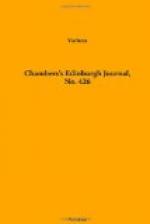One, after all, cannot wonder at this change, when he contrasts the scenery of the interior of an infant school with that of the generality of poor homes. The child, making, as it were, its first voyage in life, has here been introduced, not merely to a society conducted on principles of gentleness and kindness, but to a fairyland of marvels for the fascination of its intellectual faculties. From the ceiling to the dado—the wainscotted space at the base, for in Hungary this old arrangement is still maintained in its fullest form—the walls are covered with pictures of scripture scenes and objects in natural history; while the dado itself, terminating above in a shelf, exhibits busts, stuffed animals, and pots of flowers—the whole place, indeed, being a kind of museum, specially adapted for the enjoyment as well as instruction of the young. At first, filled with wonder and delight, the infant begins to study the meaning and character of these objects: after a short attendance, you find they can tell the names of many, and speak many things regarding them. One day, while attending a Bohemian infant school, which was dismissing, and as I was examining some of the birds upon the shelf, a little hand was insinuated into mine, as if to get it warmed—as is often done by children—when, looking down, I beheld a bright, intelligent face, apparently eager to make some communication. ‘Tuzok, tuzok!’ (’Bustard, bustard!’) said a little voice. Encouraged by my smile, there was immediately added: ’Ez tuzok, ez mazzar honban, tisza fetoel joenn;’ (’That is a bustard from Hungary, from the river Teiss.’) Another little one, attracted by this observation, pointed to the elephant, and said in German: ’Und der ist elephant: er kommt von weiten, von ausland—von morgenland!’ (’And that is the elephant: it comes from far, from a foreign land—from the morning-land!’)—that is, the East!
The children learn the first rudiments of religion, duty and obedience to their parents and teachers, spelling, &c. After the expiration of the time allotted to them here, they are sent to the normal schools, where they are instructed in all the various branches of education which are necessary to fit them for any situation or profession for which their several talents seem to have destined them.
All parents of the lower classes are compelled by law to send their children to school at a certain age. If they are in easy circumstances, they contribute a small sum monthly towards the expenses of the establishment. Those who are unable to pay the full sum, pay the half or a part; others, again, such as a great portion of day-labourers with large families, and who cannot even supply their children with necessary food and clothing, pay nothing: it is merely necessary for these to be furnished with a certificate of their incapacity to pay for the education of their children, and the state takes the whole charge of their instruction on itself.




